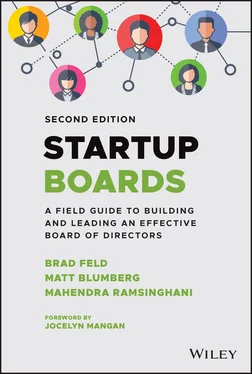Brad Feld - Startup Boards
Здесь есть возможность читать онлайн «Brad Feld - Startup Boards» — ознакомительный отрывок электронной книги совершенно бесплатно, а после прочтения отрывка купить полную версию. В некоторых случаях можно слушать аудио, скачать через торрент в формате fb2 и присутствует краткое содержание. Жанр: unrecognised, на английском языке. Описание произведения, (предисловие) а так же отзывы посетителей доступны на портале библиотеки ЛибКат.
- Название:Startup Boards
- Автор:
- Жанр:
- Год:неизвестен
- ISBN:нет данных
- Рейтинг книги:3 / 5. Голосов: 1
-
Избранное:Добавить в избранное
- Отзывы:
-
Ваша оценка:
- 60
- 1
- 2
- 3
- 4
- 5
Startup Boards: краткое содержание, описание и аннотация
Предлагаем к чтению аннотацию, описание, краткое содержание или предисловие (зависит от того, что написал сам автор книги «Startup Boards»). Если вы не нашли необходимую информацию о книге — напишите в комментариях, мы постараемся отыскать её.
Startup Boards: A Field Guide to Building and Leading an Effective Board of Directors
Startup Boards
Startup Boards — читать онлайн ознакомительный отрывок
Ниже представлен текст книги, разбитый по страницам. Система сохранения места последней прочитанной страницы, позволяет с удобством читать онлайн бесплатно книгу «Startup Boards», без необходимости каждый раз заново искать на чём Вы остановились. Поставьте закладку, и сможете в любой момент перейти на страницу, на которой закончили чтение.
Интервал:
Закладка:
Rebecca Kaden, Union Square Ventures, Partner
The duty of care and the duty of loyalty primarily define board members' fiduciary duties.
Duty of Care: A board member needs to be attentive and prudent in making board-level decisions, acting in good faith, and conducting enough business investigation and supervision to provide an informed basis for decisions. A board member breaches their duty of care when they act negligently or know that the consequences of an action could be harmful to the company.
Duty of Loyalty: A board member should ensure that the company's interests are always on their mind. Loyalty to the company supersedes any other vested interests the board member might have. A board member breaches their duty of loyalty when they put their interests ahead of the company, conduct inappropriate transactions which benefit the board member (“self-dealing”), or benefit personally from confidential information shared in the boardroom.
VC board members, especially when they are major shareholders, are also focused on making a financial return for their fund, which can generate a conflict of interest in certain situations. Jon Callaghan (True Ventures, Managing Partner) says, “As long as you are a board member, you have to focus on what is best for all shareholders. This can be difficult for VCs. Afterward, you can go home and fret all you want about your fund not making a better return.” In actual conflict situations, a VC should explain the conflict and either recuse themselves or honor their fiduciary duty to the company in a board vote, while reserving the right to vote differently as a shareholder.
Additional legal obligations include the duty of confidentiality and the duty of disclosure . While linked to the duty of care and duty of loyalty, they're just as important.
Duty of Confidentiality: A subset of the duty of loyalty, the duty of confidentiality requires a board member to maintain the confidentiality of nonpublic information about the company.
Duty of Disclosure: A subset of both the duties of care and loyalty, the duty of disclosure requires a board member to take reasonable steps to ensure that a company provides its stockholders with all material information about a matter for which stockholder action is sought.
While these duties may sound conceptually straightforward, in practice, they're subject to judgment and interpretation based on the specific situation. In legal disputes over board action, courts apply a legal construct, called the business judgment rule , which gives deference to the decisions of boards where the directors acted in good faith and in an informed manner. Courts generally apply the business judgment rule and uphold the decisions of boards if:
1 The directors don't have any personal interest in the outcome.
2 The directors have reviewed all relevant information before deciding.
3 The directors believe that the decision is in the best interests of the company.
This rule helps protect a director from personal liability for bad business decisions by essentially shifting the burden of proof to a plaintiff to demonstrate that the director didn't satisfy this test. On the other hand, if directors have an interest in the decision or fail to adequately inform themselves about the decision to be made, courts may apply a more rigorous standard to the board's conduct.
Addressing Conflicting Duties
Conflicts between fiduciary duties, such as the one mentioned by Jon Callaghan above, periodically come up in the boardroom. Some VCs are transparent when faced with a conflict, while others are opaque. In other situations, especially with inexperienced VCs, they aren't even aware of the conflict. Helping you identify and navigate these situations is another reason to have experienced outside counsel at every board meeting.
If you get your knowledge and experience about boardroom dynamics from TV shows like Billions and Succession , you might think that the legal dynamics are the things the lawyers have to deal with, so your goal is just to win the negotiation when there's a conflict. However, if you are trying to build an effective company with a highly functional board, you'll realize that whenever a conflict arises, the best approach is to air it out, debate it, and figure out a solution before the conflict escalates.
Imagine a situation where an acquirer makes a moderately appealing offer to buy a company. In this situation, the founders, the common shareholders, the early investors (let's call them Early VC), and the employees will make a nice return. However, the last-round investor will only get its money back. While the company can continue to operate for a year with the cash in the bank, the founders and early investors decide they would like to sell the company. However, the last-round investor (let's call the firm Late VC) doesn't want to sell.
Late VC previously negotiated blocking rights as part of its protective provisions (in the financing documents) on the sale of a company for less than 1.5× their investment. This disagreement is the first time this particular issue has come up, and no one other than the Late VC realizes that Late VC can block the transaction using its protective provision.
The board discusses the transaction extensively, with Late VC insisting the company should keep running independently for at least another year, given the potential future opportunity. However, the founders and Early VC want to cash in. Not realizing that Late VC has blocking rights, Early VC says, “Let's put it to a vote.” The founder/CEO forgot to invite outside counsel to the board meeting, so no one reminds the board members of Late VC's blocking rights.
In this situation, there's a board vote and, while Late VC votes against the transaction, a majority of board members vote to sell the company. However, Late VC says, “Hang on a second, I'm going to exercise my preferred right to block the sale of the company.” Everyone looks at each other angrily. Early VC rolls out the phrase “fiduciary duty” and angrily tries to school Late VC, who is very experienced, that Late VC has a fiduciary duty to all shareholders. Late VC smiles coyly and counters that it also has a fiduciary duty to its limited partners and is protecting that duty by exercising the protective provision it negotiated as part of the last financing round.
Eventually, one of the founders says, “Late VC board member, what do you want?”
Late VC responds, “At least 1.5× my investment or let's keep running the company since we have plenty of cash on the balance sheet—the cash that I recently gave you!”
It's worth recognizing the Late VC could have also voted, in its capacity as a board member, for the transaction but then exercised its protective provision separately to block the transaction from proceeding.
There are multiple solutions to this situation. But understanding the potential conflicts early, especially in any transactional situations, and having open discussions about how to resolve them that include the advice of counsel are the best approach.
Benefit Corporations and the B Corp Movement
Until recently, U.S. corporate law wasn't structured to address the situation of for-profit companies that wanted to pursue a social or environmental mission. While corporations generally can pursue a broad range of activities, corporate decision-making is justified through creating long-term shareholder value.
Benefit corporations, often called Public Benefit Corporations (PBCs) because of the Delaware legal framework, expand the fiduciary duty of directors to require them to consider non-financial stakeholders and shareholders, creating legal protection for directors and officers to consider additional stakeholders. Currently, 35 states and the District of Columbia include state laws for benefit corporations.
Читать дальшеИнтервал:
Закладка:
Похожие книги на «Startup Boards»
Представляем Вашему вниманию похожие книги на «Startup Boards» списком для выбора. Мы отобрали схожую по названию и смыслу литературу в надежде предоставить читателям больше вариантов отыскать новые, интересные, ещё непрочитанные произведения.
Обсуждение, отзывы о книге «Startup Boards» и просто собственные мнения читателей. Оставьте ваши комментарии, напишите, что Вы думаете о произведении, его смысле или главных героях. Укажите что конкретно понравилось, а что нет, и почему Вы так считаете.












